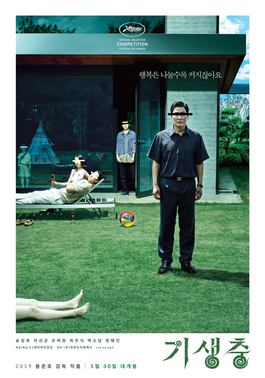
Due to director Bong Joon-ho’s track record alone, we would have gotten around to watching this eventually. Yet I am still struck by how successful this has been, both critically and commercially. Many critics have named it the best film of 2019 and it has been so talked about that it has become a meme. It’s quite an extraordinary achievement for a foreign film to gain such a cultural foothold in the US. For myself, I don’t quite see where the greatness lies. It’s a good film, of that there is no doubt, but the widespread acclaim it has garnered has made it feel overrated to me.
Jobless Kim Ki-taek and his family live in a basement space and struggles to survive. Then a friend asks his son Ki-woo to pose as a university graduate and take over his job as a tutor to the daughter of the rich Park family. The Parks live in a luxuriously appointed and after he arrives, Ki-woo manages to ingratiate himself with the family. The wife seems especially gullible and he manages to eventually get his entire family hired using tricks and schemes to discredit the previous workers and get them fired. However the house itself holds a secret that even the Parks are unaware of and Ki-taek grows to detest the derision that the Parks holds for the entire servant underclass.
Everyone keeps saying that it’s best to go in completely cold on this one with no spoilers at all but I honestly don’t see what the fuss is. As soon as the son is hired, my wife easily guessed where the story is heading. Surprises in the plot aren’t really where the strength of the film lies unlike in a piece like, say, Knives Out. Its true strength I believe is how it packs so much social commentary into a perfectly crafted package. From faking certificates and resumes to get a job, to the mnemonic phrase that Ki-taek’s daughter Ki-jeong uses to keep her cover story straight, and of course to contrast their family’s relative squalor and desperation to the display of wealth that the Park family casually exercises. Unfortunately there are bits that I don’t quite get. For example, the scholar’s stone that Ki-woo is gifted and subsequently takes to carrying around probably has some special significance in Korea that eludes me. The director manages to bring each of these characters to life with plenty of convincing detail and the black humor is simply outstanding.
Underneath the scheming, the theme remains the familiar one of class struggle. The film’s stroke of genius is that it doesn’t directly pit the rich against the poor, at least not at first. Instead it is the underclass who desperately fight among themselves for whatever scraps trickle down from the rich, a truer to life representation than a direct struggle. At the same time, the disdain that the rich hold for the poor is powerfully expressed at the Parks’ complaint about their distinctive smell. In case one is tempted to dismiss the Kims’ poverty as being a result of laziness, the sudden flood that the family experiences puts paid to that. As Ki-taek remarks, for the poor it doesn’t matter how well you plan when all it takes is one disaster to ruin your life. On the other hand, the Parks have the resources to bounce back from the setback as if were nothing, with the wife explicitly commenting that they can make lemonade out of lemons. It makes for a wonderfully cogent and incisive social commentary.
As intelligent and well-written as it is however, I mark it down somewhat for its reliance on a plot that tries to be too clever but is actually kind of predictable. I also feel that the tussle between the Kims and the household’s previous housekeeper is another plot-heavy distraction. While the story is cleverly written, all these distractions and weirdness mean that I found it difficult to directly sympathize with the Kims. Still I happily agree that this truly is an excellent film even if I feel that all the praise for it is a little off-putting.
One thought on “Parasite (2019)”